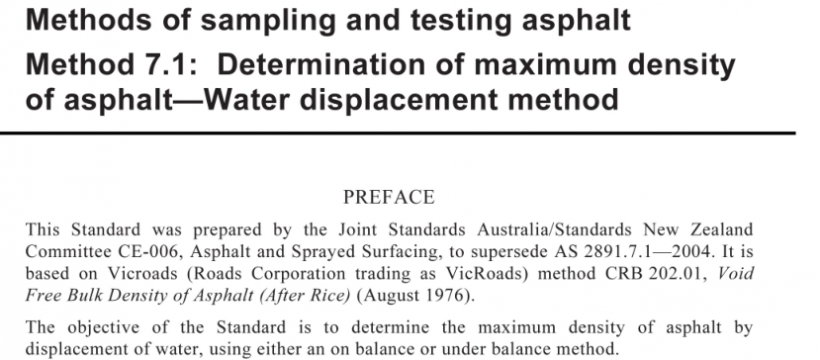AS NZS 2891.7:2015 pdf free download
AS NZS 2891.7:2015 pdf free download.Methods of sampling and testing asphalt
9.2 Pycnometer on balance method
The procedure shall be as follows:
(a) Place the test portion in the pycnometer.
(b) Weigh the pycnometer, lid and test portion, and record the mass (m3).
(c) Pour water into the pycnometer until the water level is about 50 mm above the level of the test portion. 2 mL of detergent solution may be added to the pycnometer to aid evacuation of air from the sample.
(d) Attach the pycnometer to the vacuum pump and evacuate the pycnometer to a vacuum of -90 kPa gauge pressure or lower, and maintain the vacuum for a period of not less than 15 minutes. Vigorously agitate the pycnometer frequently to loosen the particles and release any entrapped air.
NOTES:1 Care should be taken when applying the vacum particularly in the initial stages to prevent loss of material.
2 Care should be taken to ensure the sample is not left under vacuum for an excessive period of time as this may lead to rupture of the bitumen film and absorption of water by the aggregate; typically 15- -20 minutes of vacuum with frequent agitation is sufficient.
3 Where a glass pycnometer is used a rubber mat below the pycnometer is recommended.
(e) When no entrapped air is observed, release the vacuum slowly and disconnect the vacuum pump from the pycnometer.
(f) Fill the pycnometer with water from the water bath and place in the water bath, ensuring no loss of the test portion during the process and that no air is introduced into the test portion.
(g) Leave the pycnometer in the water bath until the water temperature in the flask and water bath are the same. Record the temperature of the water (t1).
(h) Top up the pycnometer with water from the water bath and slide on the lid, ensuring that no air bubbles are trapped.
(i) Remove the pycnometer from the water bath and with the lid securely held in place, invert the pycnometer several times.
(j) If air bubbles are observed, repeat Step (h) until all air is eliminated.
(k) Carefully dry the pycnometer. Weigh the pycnometer, lid, test portion and water, and record the mass (m4).
AS NZS 2891.7:2015 pdf free download
